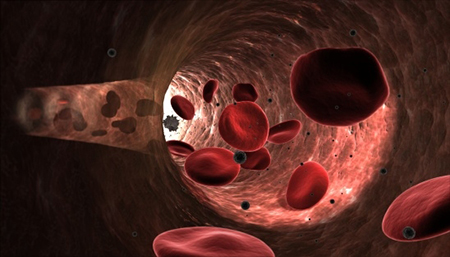
As scientists investigate the medical potential for adult stem cells, new research from the Baylor Health Care System’s Soltero Cardiovascular Research Center (SCRC) seeks to provide deeper insight on the topic.
Led by Cara East, MD, medical director of the SCRC, the center is involved in a set of two clinical trials studying the use of autologous adult stem cells in various heart and vascular conditions. The team has researched stem cells in particular for more than eight years because of the cells’ special ability to “mend.” Autologous stem cells come from the patient’s own body.
“Adult stem cells are actually ‘super repair cells,’” Dr. East said. “We know – from recent, basic research – that adult stem cells do not transform into new cells. Rather, they stimulate removal of scar tissue, which then causes healthy cells to grow and replenish. After the healthy cells do their work, the adult stem cells die; they may only live two weeks to three months. This ensures that the repair cycle does not continue indefinitely, which could result in tissue overgrowth.”
Each clinical trial has its own unique criteria, objectives and parameters, but they share one similar goal: to explore (and possibly harness) the human body’s restorative power through its own cells. The studies are:
CLI: This trial studies patients with critical limb ischemia (CLI), which causes severe blockages, pain and tissue loss in the legs. Critical limb ischemia (CLI) is the most severe form of peripheral arterial disease (PAD) caused by chronic inflammatory processes associated with atherosclerosis that result in markedly reduced blood flow to the legs, feet and hands. There are an estimated 10-12 million people with PAD in the United States and over 1 million people with CLI. The research will determine if the injection of bone marrow into damaged tissues improves blood flow. Like angina, CLI cannot currently be treated with any other therapies.
ixCELL: This study is for patients with congestive heart failure. Through this research, investigators will determine if the catheter-based injection of ixmyelocel-T (compared with placebos) is effective, safe and tolerated for certain heart failure patients. Ixmyelocel-T is developed by culturing the patient’s own bone marrow. The resulting cell treatment is then injected into the patient’s heart muscles to encourage growth of new tissue and improve inflammation.
Backed by the collective goal to facilitate the healing process, Dr. East and her team at SCRC hope to glean valuable insight about the body’s own unique way to heal itself.
“Our dream is to develop therapies that are less invasive and can help patients who cannot currently be helped with available therapies,” Dr. East said. “Plus, we hope this research leads us to treatments that work even better than our current therapies.”
To find out more about clinical research trials at Baylor Scott & White Health, visit www.baylorhealth.com/research
# # #
MEDIA CONTACTS:
Kristine Hughes
(214) 820-7556
Kristine.Hughes@baylorhealth.edu
Susan Hall
(214) 820-1817
Susan.Hall@baylorhealth.edu
About Baylor Scott & White Health
As the largest not-for-profit health system in the state of Texas, Baylor Scott & White promotes the health and well-being of every individual, family and community it serves. It is committed to making quality care more accessible, convenient and affordable through its integrated delivery network, which includes the Baylor Scott & White Health Plan, Baylor Scott & White Research Institute, the Baylor Scott & White Quality Alliance and its leading digital health platform – MyBSWHealth. Through 51 hospitals and more than 1,200 access points, including flagship academic medical centers in Dallas, Fort Worth and Temple, the system offers the full continuum of care, from primary to award-winning specialty care. Founded as a Christian ministry of healing more than a century ago, Baylor Scott & White today serves more than three million Texans. For more information, visit: BSWHealth.com
